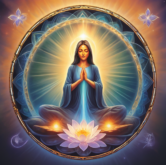- Facebook0
- Twitter0
- Google PLuse0
- 0Shares
- 14 Views
Is Marriage Predestined?
The question of whether marriage is predestined is one that has intrigued human minds across cultures, religions, and philosophies. Marriage, often seen as a significant life event, raises debates about the role of fate versus free will. Let’s explore this concept by examining cultural beliefs, spiritual perspectives, and logical reasoning.

Cultural and Religious Perspectives
In many cultures, marriage is viewed as a union guided by divine intervention or predestined by a higher power. Here are some beliefs:
- Hinduism:
In Hindu philosophy, the concept of “karma” and “samskaras” suggests that marriages might be predestined due to actions in previous lives. The idea of the “seven births” (saat janam) often implies that some bonds are meant to recur across lifetimes. - Islam:
In Islamic tradition, it is believed that Allah has written every person’s fate, including marriage, in the Lauh-e-Mahfuz (Preserved Tablet). However, this belief also emphasizes the importance of personal effort and prayer (dua). - Christianity:
Christians often see marriage as part of God’s divine plan. Passages in the Bible suggest that God orchestrates relationships for a purpose, but humans are granted free will to choose their paths. - Buddhism:
While Buddhism doesn’t directly discuss predestined marriage, it emphasizes karma and the interconnectedness of all beings. Relationships might arise as a result of past actions, but individuals are ultimately responsible for their choices.
Spiritual Perspectives
Many spiritual teachings blend the concepts of fate and free will. From this standpoint, life events like marriage might have a “blueprint” influenced by universal energy, soul contracts, or synchronicities:
- Soulmates and Twin Flames:
Some spiritual beliefs hold that certain relationships, such as those with soulmates or twin flames, are predestined to help individuals grow and fulfill their soul’s purpose. - Law of Attraction:
The Law of Attraction suggests that individuals attract relationships based on their energy and intentions. While this implies agency, it can feel predestined when aligned energies bring two people together.
Free Will and Personal Choice
While predestination implies a lack of control, others argue that marriage is a product of personal choices, circumstances, and societal factors:
- Practical Arrangements:
In many cultures, arranged marriages are common. While families may invoke destiny, these unions often depend on practical compatibility, family ties, and social status. - Timing and Effort:
Meeting someone and forming a bond requires effort. Timing, location, and mutual willingness are critical, suggesting that marriage results from choice rather than fate. - Chance and Coincidence:
Many relationships begin by chance—a casual meeting, a shared interest, or a random encounter. These events can feel fated, but they’re often a series of decisions made along the way.
The Role of Science
Scientific perspectives focus on psychological, biological, and social factors in relationships. Marriage is often seen as a result of:
- Compatibility and Chemistry:
Psychological compatibility and physical attraction play significant roles in forming bonds. - Cultural and Environmental Influences:
Shared cultural backgrounds, education levels, and economic conditions often determine the likelihood of marriage between two people. - Neuroscience of Love:
Hormones like oxytocin and dopamine influence bonding, which might explain the feeling of inevitability in relationships.
Balancing Fate and Free Will
Perhaps the answer lies in a blend of fate and free will. Life may present opportunities, encounters, and potential partners, but how individuals respond to these events depends on their actions and choices.
- Fate as a Guide:
Destiny may bring people together, but maintaining a relationship requires effort, communication, and commitment. - Choice as Empowerment:
Regardless of predestination, individuals have the power to choose their partners, work through challenges, and shape their futures.
Conclusion
Is marriage predestined? The answer depends on one’s beliefs, culture, and perspective. For some, it’s comforting to believe that a higher power or cosmic force orchestrates such unions. For others, the emphasis on choice, effort, and compatibility reinforces the belief that relationships are human-made.
Ultimately, whether marriage is predestined or not, its success depends on understanding, trust, and a shared vision. While destiny might play a role in bringing two people together, the path they take afterward is shaped by their collective decisions and actions.
How to create Secure attachment style.


One Reply to “Is Marriage Predestined or Self-Made?”